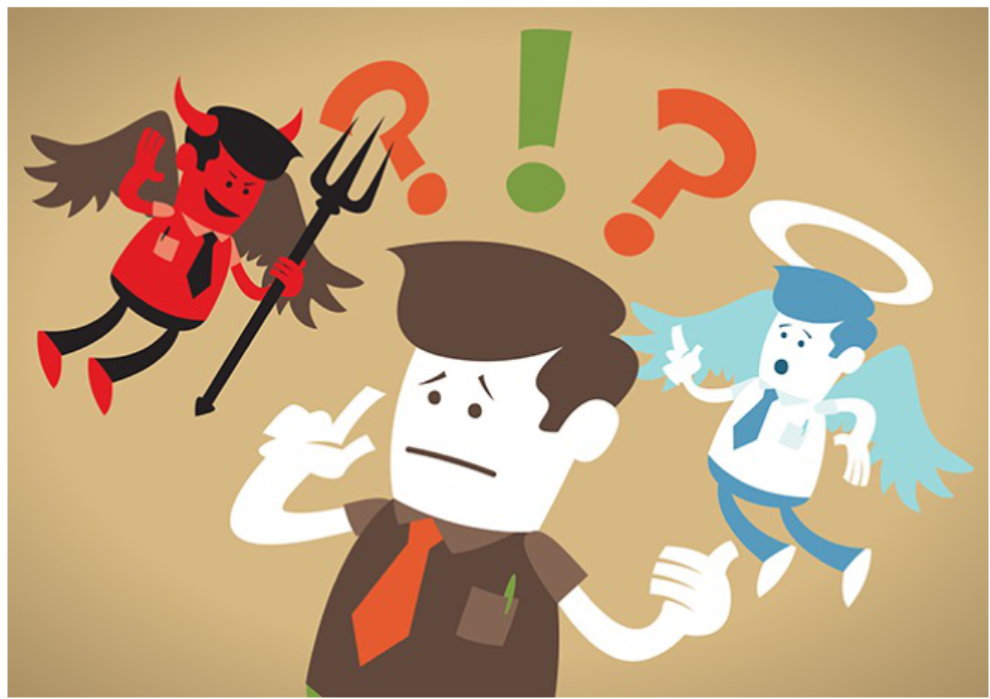Durante una delle prime lezioni di filosofia abbiamo parlato della moralità e da dove proviene questo concetto. Partendo dalla sua definizione, si parla di moralità quando prendiamo in considerazione i principi relativi alla distinzione tra giusto e sbagliato o comportamento buono e cattivo. Questa definizione è direttamente connessa con una domanda: chi decide cosa è giusto e cosa invece è sbagliato?
Per secoli sociologi, filosofi, scienziati e teologi hanno discusso intorno a questa domanda: alcuni di loro poi hanno suggerito che la decisione potrebbe derivare dalla società (Emile Durkheim), o dai genitori (Sigmund Freud), dall’evoluzione (Charles Darwin) o addirittura da Dio.
Quando la professoressa ci ha chiesto cosa ne pensassimo, noi abbiamo trovato questa domanda molto complessa: ognuna delle risposte che sono state date da questi pensatori sembrava essere giusta (parzialmente o totalmente), però incompleta. Come possiamo sapere quando qualcosa come la moralità (di cui non sospettiamo l’esistenza finché non ci interroghiamo) è in qualche modo collegata con la nostra famiglia, la religione o l’evoluzione? Non può essere semplicemente un insieme di alcune (se non tutte) le teorie che sono state presentate?
Abbiamo lentamente realizzato che l’unico modo in cui si può rispondere a questa domanda è scoprire cosa le altre persone pensano riguardo a ciò e il modo in cui la prospettiva e la cultura degli altri è diversa dalla nostra. In modo da riuscire a fare questo, dobbiamo anche pensare e osservare le nostre esperienze: da dove provengono i valori in cui io credo? Perché penso che qualcosa sia buono o cattivo? Da dove viene la consapevolezza che esiste qualcosa di buono e qualcosa di cattivo?
Ogni giorno noi incontriamo la moralità: a scuola, a casa guardando il telegiornale, sui social, …
è importante non basarsi solo sulla propria opinione personale riguardo i diversi argomenti a cui siamo esposti: dobbiamo domandarci da dove viene la nostra opinione, se è influenzata dalla cultura in cui viviamo, dalla religione, dal nostro background familiare o dal ricordo della nostra esperienza personale.
—————————————————————————————————————————————————————————————————————————
One of the first lessons of the philosophy course was about morality and where does it come from. Starting from its definition, we talk about morality when we consider principles concerning the distinction between right and wrong or good and bad behavior. This definition is directly linked to the first question: who have decided what is right and what is wrong?
Sociologists, philosophers, scientists and theologists have been discussed for centuries about that: some of them have suggested that it might come from society (Emile Durkheim), our parents (Sigmund Freud), evolution (Charles Darwin) or even God.
When the teacher asked us what we thought about it, we found the question challenging: every answer those thinkers had given seemed to be partially right and incomplete. How could we know whether something like morality (which we don’t know the existence of until we question it) is in some way related to our family background, religion or evolution or not? Can’t it be a mix of some (if not all) of them?
We’ve slowly realized that the only way we could answer this question was to find out what other people had said about it and how others’ perspectives and cultures differed from mine. In order to do that, we also needed to think and look at our own experience: where do the values we believe in come from? Why do we think something is good or bad? Where does this knowledge of good and bad, right and wrong come from?
Everyday we deal with morality: at school, at home watching the news on the TV, scrolling on social media etc… and thanks to that lesson we’ve learned not only to build my personal opinion about the different issues or topics we’m exposed to, but also to ask myself where does that opinion come from, if it is influenced by the culture I live in, religious believes, my family background or the memory of my personal experience.
Beatrice Zanarini
